This Week in History
April 6 - 12, 1865
April 9, 1865: Surrender at Appomattox
by Dennis Speed
April 2014
“You know that the government of United States has few friends among the Powers. England rejoices over what is happening to you; she longs and prays for your overthrow. France is less actively hostile; her interests would be less affected by the result; but she is not unwilling to see it. She is not your friend. Your situation is getting worse and worse. The chances of preserving the Union are growing more desperate. Can nothing be done to stop this dreadful war? The hope of reunion is growing less and less, and I wish to impress upon your government that the separation, which I fear must come, will be considered by Russia as one of the greatest misfortunes. Russia alone, has stood by you from the first, and will continue to stand by you. We are very, very anxious that some means should be adopted—that any course should be pursued—which will prevent the division which now seems inevitable. One separation will be followed by another; you will break into fragments.”
—Russian Foreign Minister Gorchakov, in the name of Czar Alexander II of Russia, to President Abraham Lincoln, Fall, 1862
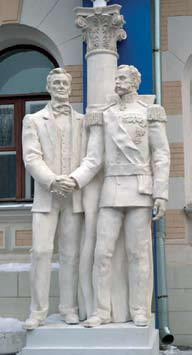 |
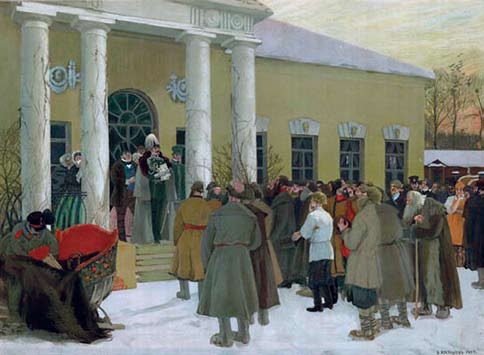 |
Russian Archives, www.rusarchives.ru
In February 2011, the Russian government held an exhibition in Moscow commemorating the collaboration between President Lincoln (“the Emancipator”) and Tsar Alexander II (“the Liberator”). The statue is a modern work by A.N. Burganov (the two leaders never actually met). The painting shows serfs listening to a reading of the Tsar’s proclamation giving them their freedom, 1861, from a 1907 original by B.M. Kustodiev. |
|
On April 9, 1865, The war commonly referred to as "the American Civil War" ended at Appomattox Court House in Virginia, with the surrender of General Robert E. Lee"s Confederate Army of Northern Virginia To Ulysses S. Grant. That war is more properly termed "The War for the Republic". Other names are often used—"The War of Northern Agression", "the War of Southern Secession", "The War Between The States"—but the conflict that was resolved that day, the bloodiest and most costly in all American history, was far different than that war which had been imagined and initiated by its instigators—not merely Southern, but British and French as well.
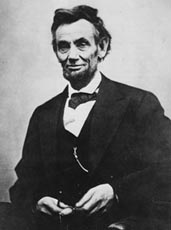 Abraham Lincoln. |
Abraham Lincoln's Second Inaugural Address, etched in stone at his Memorial in Washington, D.C. directly opposite the Gettysburg Address, explains to us the unforeseen nature of this world-transforming event more clearly than any account written since, and any account that will probably ever be presented. "Neither party expected for the war, the magnitude, or the duration, which it has already attained. Neither anticipated that the cause of the conflict might cease with, or even before, the conflict itself should cease. Each looked for an easier triumph, and a result far less fundamental and astounding". From New Mexico to Florida, concentrated in Virginia and Tennessee but fought in literally thousands of battlefields, the conflict saw more than 620,000 soldiers slain, representing slightly less than half of all American military killed in action in all conflicts (minus covert actions, police actions, etc.) from the time of the Revolutionary War until now. Recent re-evaluation of deaths due to the war argues a figure closer to 850,000, but even without that, the hellish devastation that was brought to bear in the service of the war is undeniable.
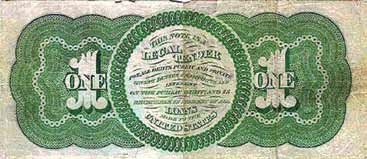 |
|
President Abraham Lincoln defeated the British Empire in the Civil War by applying the Hamiltonian principle of credit. He used the "Greenback" (shown here) to defeat Wall Street, and build the greatest industrial machine the world had seen to that point-exemplified by the Transcontinental Railroad, shown during its construction. |
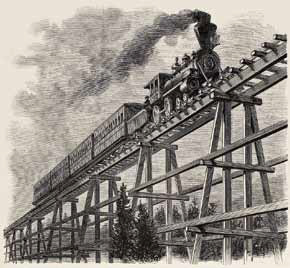 |
Yet, if the American Revolution was the "baptism by fire" of the America that would become the United States, the four-year war brought to conclusion at Appomattox was its "sacrament of confirmation". As has been pointed out by one or two astute historians, before the war, it was common to read and hear the country referred to as "the United States are". After 1865, there was only one acceptable usage: "the United States is". One nation, indivisible: the republic had not merely endured as a unity, but created the most powerful economy and nation-state that had ever existed. Indeed, Lincoln had re-established Alexander Hamilton's credit system, destroyed earlier by Andrew Jackson and Van Buren, through his famous "greenback policy", this under the revolutionary conditions provided by the war, but in strict adherence to the Preamble of the Constitution's provisions of securing the common defense and promoting the general welfare.
It was to Lincoln that it would fall to successfully deploy the United States Constitution as a scientific-revolutionary instrument, and to, by preserving the republic, revolutionize it. What appeared to many, to be his "plodding, equivocal" course, was to result in the creation of, not an entirely new United States, but an entirely advanced United States. Friedrich Schiller had posed the problem of the art of statecraft in his work On The Aesthetic Education of Man thusly: "The great deliberation is therefore that the physical society may not cease in time for a moment, whilst the moral forms itself in the idea...If the artist has to repair a clockwork, so he lets the wheels run down; bit the living clockwork of the state must be repaired, whilst it strikes, and here it means, to exchange the rolling wheel during its revolution". Lincoln's Idea of the American Constitution, certainly not that of his foes and often not that of his friends, allowed him to discover in the midst of fratricidal chaos how to accomplish a revolution while preserving the American form of government.
Lincoln's Republican Party had a mission, for the which Lincoln's Presidency was intended. Lincoln re-stated this mission in a famous, and, to some, controversial letter written to Horace Greeley, August 22,1862:
"I would save the Union. I would save it the shortest way under the Constitution. The sooner the national authority can be restored; the nearer the Union will be "the Union as it was." If there be those who would not save the Union, unless they could at the same time save slavery, I do not agree with them. If there be those who would not save the Union unless they could at the same time destroy slavery, I do not agree with them. My paramount object in this struggle is to save the Union, and is not either to save or to destroy slavery. If I could save the Union without freeing any slave I would do it, and if I could save it by freeing all the slaves I would do it; and if I could save it by freeing some and leaving others alone I would also do that. What I do about slavery, and the colored race, I do because I believe it helps to save the Union; and what I forbear, I forbear because I do not believe it would help to save the Union. I shall do less whenever I shall believe what I am doing hurts the cause, and I shall do more whenever I shall believe doing more will help the cause. I shall try to correct errors when shown to be errors; and I shall adopt new views so fast as they shall appear to be true views. (emphasis added)
Now, consider that Lincoln had already, more than one month prior to writing this letter to Greeley, authored his Emancipation Proclamation, which declared that some nearly 3 million slaves would be free as of January 1,1863, if those Southern states currently in rebellion against the republic did not cease and desist. (In July, this was only known to his cabinet, whose members urged him to wait to announce it.) Further, consider this passage from his March 4, 1865 Second Inaugural Address, concerning his best evaluation of the very cause of the war:
"One-eighth of the whole population were colored slaves, not distributed generally over the Union, but localized in the southern part of it. These slaves constituted a peculiar and powerful interest. All knew that this interest was somehow the cause of the war. To strengthen, perpetuate, and extend this interest was the object for which the insurgents would rend the Union even by war, while the Government claimed no right to do more than to restrict the territorial enlargement of it."
Lincoln, then, clearly saw that the cause of the war was in fact slavery. He had made clear what he believed about this in his June 16, 1858 acceptance speech as the Republican Party candidate for the United States Senate. "'A house divided against itself cannot stand'. I believe that this government cannot endure, permanently half slave and half free. I do not expect the Union to be dissolved—I do not expect the house to fall—but I do expect it will cease to be divided. It will become all one thing, or all the other." The last thing that Lincoln can be accused of, in fact, is temporizing on the question of slavery. Others, however, to a man, nearly, were willing to temporize on the primacy of the republic, and with this, Lincoln was ruthlessly merciless—because it was unprincipled.
The Strategy of Freedom
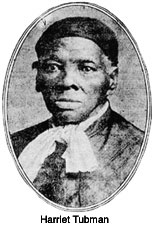 |
Lincoln's war against slavery was not the war of John Brown, or of the abolitionists, many of whom believed, or claimed to believe it better to secede from the nation, rather than "be defiled by continuing to tolerate political and commercial association with this detestable traffic in human flesh". The survival of the republic, "indivisible", for them was secondary. There was an attraction for many to the "John Brown solution", even including Harriet Tubman, the escaped slave who returned to the South 19 times to, as in Plato's "cave allegory", lead over 300 people out of bondage, and who certainly believed in the "illegal" liberation of human beings from the yoke of captivity . However, the "John Brown solution", besides being suicidal, was also insane. And Tubman, who was in fact doing something much different than Brown, knew and revealed something that Brown would die never understanding. At a ceremony decades later, celebrating her successful freeing of 1,000 people (including her June 1, 1863 Cohambee River, South Carolina raid, the which liberated over 700), Tubman said: "I could have freed another thousand if I could have convinced them that they were slaves."
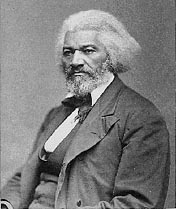
Frederick Douglass. |
Orator, Constitutional scholar, and Lincoln collaborator Frederick Douglass, who met with Brown on the eve of the Harper's Ferry raid, was not persuaded either. Douglass had made clear to Brown, on more than one occasion, that the Republic and the Constitution must come first. Douglass would eventually succeed, despite some initial, and even recurring differences between them, in working together with Lincoln to recruit over 200,000 African-American soldiers to serve in the military for the Union. Brown would, in contrast, in October 1859 at Harper's Ferry, attempt to provoke a "mass slave revolt" by seizing the Federal arsenal there, with its 100,000 weapons. Not a single slave is known to have rallied to Brown.Yet, four and five years later, twice that many rifles would be wielded by the 200,000 men recruited through the collaboration of Lincoln and Douglass and Lincoln's January 1, 1863 Emancipation Proclamation. This defense of the Constitution was the decisive factor in the abolition of slavery, which occurred only as a derivative effect of the successful preservation of the Republic. Another 200,000 African-Americans would provide logistical and medical support in non-combatant roles.
Lincoln's Constitutionalists, including his imperfect but determined cabinet, and his unruly, recalcitrant faction in the Congress, were committed to preserving the republic, and by so doing, defeating, not merely slavery, but the real perpetrators of the trade—the financial powers of Europe, particularly the British Empire. Yes, Britain had "abolished slavery" in 1833, but the vast majority of the property titles of the plantations in the South were held in London by Brown Brothers, and other financial institutions. To pay their debt, the plantations sought to increase the extent, as well as the brutality of the system, which had been dying out. It was the murder of the Second National Bank, by Andrew Jackson and his (and Aaron Burr's) Presidential successor, Martin Van Buren, that perpetrated the subservience of the United States to British financial interests.
On the other hand, America's ally, Czar Alexander II's Russia, sent its fleet to both New York and San Francisco harbors in 1862 to deter French and British vessels from running the blockade that had been established by the Union against Confederate receipt of goods from those two countries. Lincoln's friend and ambassador to Russia, Kentucky abolitionist Cassius Marcellus Clay, was a fierce opponent of both England and slavery, which he saw as synonymous. "(I)n a dispatch to Lincoln from St. Petersburg, dated July 25, 1861", Clay had said:
“I saw at a glance where the feeling of England was. They hoped for our ruin. They are jealous of our power. They care neither for the North nor the South. They hate both. The London Times ... in concluding its comments on your message [Lincoln's July 5, 1861 message to Congress] says: ‘And when we prefer a frank recognition of Southern independence by the North to the policy avowed in the President's message, it is solely because we foresee as bystanders that this is the issue in which after infinite loss and humiliation the contest must result.’ And that is the tone of England everywhere....
“All the Russian journals are for us. In Russia we have a friend. The time is coming when she will be a powerful one for us. The emancipation (of the 50 million Russian serfs March 3, 1861) move is the beginning of a new era and new strength. She has immense lands, fertile and undeveloped in the Amoor country, with iron and other minerals. Here is where she must make the centre of her power against England. Joined with our Navy on the Pacific coast we will one day drive her (England) from the Indies: The source of her power: and losing which she will fall.”
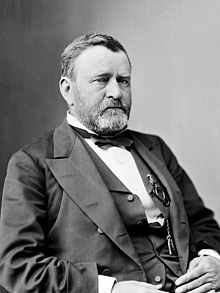 Ulysses S. Grant. |
Once Lincoln found his fighting general in the person of Ulysses S. Grant, and his "greenbacks" credit policy transformed and upgraded American manufacturing, including allowing the construction of the world's first trans-continental railroad, the American System's triumph over the Confederacy, and thus the triumph of the Constitution, was secured. In his Memoirs, Grant concluded:
"It is probably well that we had the war when we did...our republican institutions were regarded as experiments up to the breaking out of the rebellion, and monarchical Europe generally believed that our republic was a rope of sand that would part the moment the slightest strain was brought upon it. Now it has shown itself capable of dealing with one of the greatest wars ever made, and our people have proven themselves to be the most formidable in war of any nationality. "But this war was a fearful lesson, and should teach us the necessity of avoiding wars in the future." |
The gentle strength expressed in the Second Inaugural's conclusion— "With malice toward none, with charity for all, with firmness in the right as God gives us to see the right, let us strive on to finish the work we are in, to bind up the nation's wounds, to care for him who shall have borne the battle and for his widow and his orphan, to do all which may achieve and cherish a just and lasting peace among ourselves and with all nations"—was coupled with a fierce resolve on the part of Lincoln that demanded from the South unconditional surrender, a surrender that was delivered to Lincoln by General Grant at Appomattox Court House, April 9,1865. Lincoln's enemies, the enemies of humanity, would assassinate him three days after the surrender at Appomattox, but the Promethean achievement of Lincoln, including putting fire-arms into the hands of once-slaves that fought, first for their republic, and then for themselves, was already immortal.
Leo Tolstoy Holds Lincoln World’s Greatest Hero
This excerpt is from an article that first appeared in the February 7, 1909, issue of the New York World. The article is entitled “Tolstoi Holds Lincoln World’s Greatest Hero” by Count S. Stakelberg (Written Especially for The World) and can be found here http://www.loa.org/images/pdf/Tolstoy_on_Lincoln.pdf.
“…Now, why was Lincoln so great that he overshadows all other national heroes? He really was not a great general like Napoleon or Washington; he was not such a skilful statesman as Gladstone or Frederick the Great; but his supremacy expresses itself altogether in his peculiar moral power and in the greatness of his character. He had come through many hardships and much experience to the realization that the greatest human achievement is love. He was what Beethoven was in music, Dante in poetry, Raphael in painting, and Christ in the philosophy of life. He aspired to be divine— and he was…”
